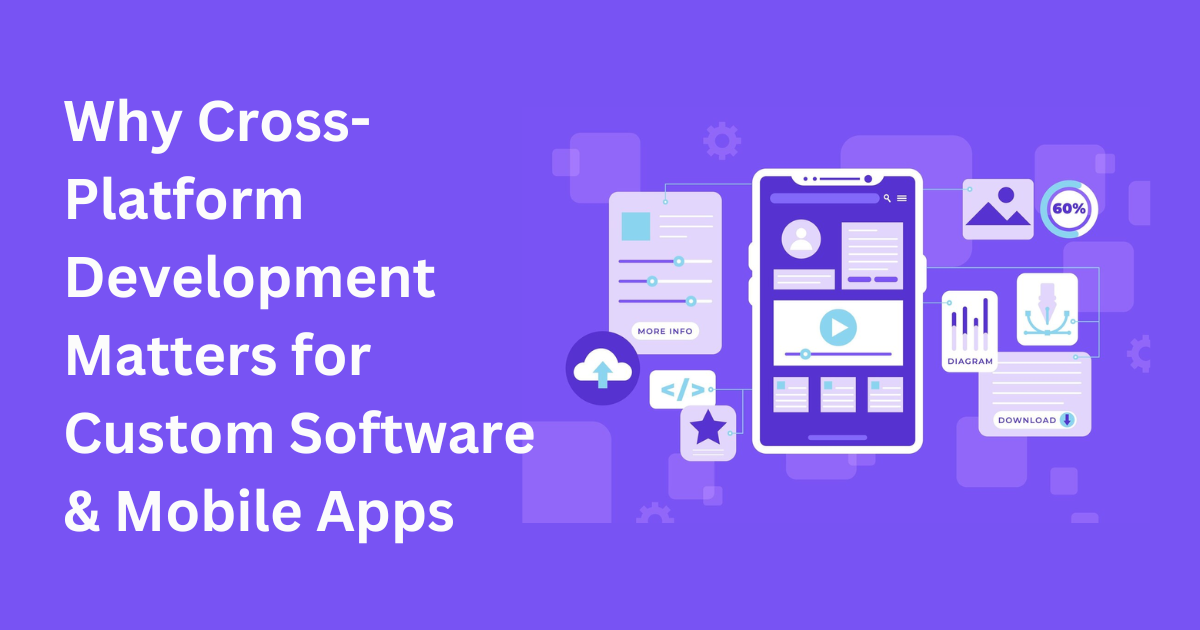Mobile app development is no longer about choosing between iOS and Android. Businesses today demand apps that function seamlessly across platforms while remaining cost-effective, scalable, and efficient. This is where cross-platform development takes center stage. It has revolutionized the industry by enabling developers to write code once and deploy it across multiple operating systems. But what makes it such a game-changer, and why should businesses prioritize it?
The Cost Factor: Efficiency Without Compromise
One of the biggest hurdles in software development is cost. Traditionally, building separate native apps for iOS and Android meant doubling expenses—two development teams, two sets of codebases, and twice the maintenance effort. Cross-platform development eliminates this redundancy. With frameworks like Flutter, React Native, and Xamarin, developers can craft a single codebase that runs efficiently across platforms, slashing costs without compromising performance.
This approach also reduces the time-to-market significantly. Businesses no longer have to wait months to launch their apps on different platforms. Instead, they can roll out their products simultaneously, gaining a competitive edge and reaching a broader audience.
Performance: Dispelling the Myths
One common misconception about cross-platform development is that it compromises performance. While this may have been true in the early days, modern frameworks have bridged the gap between native and cross-platform applications. Flutter, for instance, compiles directly to native code, offering near-native performance, while React Native uses a bridge to communicate with native modules, ensuring a seamless experience.
Unless an app demands extremely high processing power—such as complex 3D gaming—cross-platform frameworks can deliver outstanding performance while maintaining efficiency.
Unified User Experience: Consistency Across Devices
User experience is at the heart of any successful application. A consistent and intuitive interface ensures that users remain engaged, regardless of the device they use. Cross-platform development allows designers and developers to create a unified experience across multiple platforms, ensuring that branding, UI/UX, and features remain uniform.
With a single codebase, businesses can easily implement updates and changes across platforms without worrying about inconsistencies, giving them greater control over user satisfaction and retention.
Faster Development and Easy Maintenance
The more complex an app becomes, the harder it is to maintain. With separate native applications, developers must troubleshoot issues separately for iOS and Android, often leading to prolonged debugging sessions. Cross-platform development simplifies this process. Since there’s a single codebase, bug fixes, updates, and enhancements can be applied universally, reducing development time and effort.
Additionally, cross-platform frameworks provide extensive libraries, pre-built components, and plugins, enabling developers to build robust applications faster and with fewer headaches.
Reaching a Global Audience with Scalability
The ultimate goal of any business investing in mobile apps is to maximize reach. Cross-platform development ensures that applications are not limited to a specific operating system, significantly expanding market potential. With a single app running seamlessly on both iOS and Android, businesses can tap into larger user bases without additional costs.
This scalability is especially beneficial for startups and mid-sized companies looking to establish a strong presence without overextending their budgets. Whether it’s an eCommerce store, social networking platform, or enterprise solution, a cross-platform approach makes scaling a business more feasible and efficient.
The Role of Cross-Platform Development in Custom Software
While mobile apps are a significant part of digital transformation, cross-platform development extends beyond smartphones. Businesses need custom software solutions that work seamlessly across various environments, including desktops, tablets, and even wearable technology.
Web applications, progressive web apps (PWAs), and hybrid apps all benefit from cross-platform development principles. Frameworks like Electron and Flutter allow businesses to build software that operates effortlessly on multiple devices, improving accessibility and user engagement.
Companies providing software development services in California are increasingly leveraging cross-platform strategies to ensure seamless integration between mobile, web, and desktop applications. This not only enhances user experience but also streamlines business operations by keeping development efforts unified.
Security and Future-Proofing Applications
Security is a major concern for businesses investing in digital solutions. Cross-platform frameworks come with built-in security features and regular updates to mitigate vulnerabilities. Since the codebase is centralized, security patches and updates can be implemented universally, ensuring that all users receive the latest protections simultaneously.
Moreover, with emerging technologies like AI, AR/VR, and IoT becoming more prevalent, cross-platform development frameworks are evolving to support these advancements. This ensures that applications built today remain adaptable to future technological shifts, saving businesses from costly redevelopments.
Making the Right Choice for Your Business
While cross-platform development offers numerous advantages, the choice ultimately depends on the specific needs of a business. If an app requires highly specialized functionality—such as intricate graphics rendering or extensive hardware integration—native development may still be the better option.
However, for most businesses aiming to deliver high-quality apps across multiple platforms, cross-platform development is the future. It offers an optimal balance of cost, efficiency, performance, and scalability, making it the go-to solution for modern software and app development.
Conclusion
Cross-platform development is more than just a trend—it’s a necessity for businesses looking to stay competitive in today’s digital landscape. It provides a cost-effective, scalable, and efficient way to deliver high-performance applications across multiple platforms without compromising on quality.
As businesses continue to seek innovative digital solutions, cross-platform development will remain at the forefront of mobile and software engineering. For those in need of cutting-edge solutions, embracing this approach can lead to faster development, seamless user experiences, and long-term success.
If you’re looking for top-tier app development services Atlanta, now is the time to explore the benefits of cross-platform development. With the right expertise and strategy, your next app can achieve greater reach, superior performance, and lasting impact.

